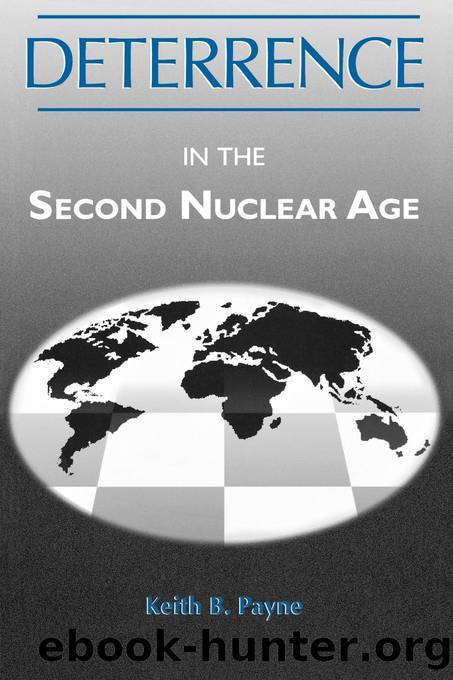Deterrence in the Second Nuclear Age by Keith B. Payne

Author:Keith B. Payne [Payne, Keith B.]
Language: eng
Format: epub
Tags: International Relations, United States, Military, Arms Control, Political Science, History, General
ISBN: 9780813184135
Google: zkooEAAAQBAJ
Goodreads: 20083226
Publisher: University Press of Kentucky
Published: 1996-10-24T00:00:00+00:00
Chapter 4
Success, Motivation, Mistakes, and Uncertainty
The reasons for seeking more power are often not merely the search for security or material advantage. Among them are demands for greater prestige, respect, and deference, in short, honor.
âDonald Kagan, On the Origins of War
Senior U.S. officials and prominent commentators, reflecting Cold Warâera confidence and assumptions, now express certainty concerning the prospective effectiveness of deterrence in the second nuclear ageâeven to the point of identifying specifically those countries against which deterrence will surely work. Chapters 2 and 3, however, suggest several reasons why the Cold War strategic deterrence paradigm may be inappropriate as the basis for confidence for the second nuclear age: (1) whereas the duties of U.S. Cold War deterrence policies were to prevent Soviet nuclear or conventional attack, in the second nuclear age, as the proliferation of WMD and delivery systems continues apace, U.S. deterrence policies will need to be adequate for the possibly more stressing mission of âdeterring the deterrentâ of a desperate challenger; (2) whereas during the Cold War the credibility of the U.S. commitment was assumed, given the intrinsic U.S. interests at stake, the regional disputes of the second nuclear age will likely involve intrinsic interests for the challenger and nonintrinsic interests for the United States, with corresponding perceptions of reduced credibility for U.S. commitments; (3) whereas, based on decades of close interaction with Soviet leaders, the U.S. may have understood that Cold War opponent sufficiently well to preclude gross surprises, in the second nuclear age such familiarity will likely be lacking in some, perhaps many cases. A mutual lack of familiarity is apparent, for example, in U.S. relations with China, North Korea, Iraq, and Iran.
In short, the context for deterrence policies will be sufficiently different from the past that we must reconsider how to apply deterrence theory, and how much confidence reasonably can be placed in deterrence policies. The question is not whether deterrence policies can or cannot work in the second nuclear age; that they can under the proper conditions is clear. Rather, the question is whether deterrence policies can be made to work with the degree of predictability and reliability claimed by U.S. officials, or at least with a predictability that provides U.S. officials with a reasonable level of confidence.
There are numerous factors that can undermine the predictable functioning of deterrence policies. Some of these factors have long been recognized, such as the possibility of unexpected behavior as is discussed in Chapter 3. Nevertheless, the Cold Warâs Assured Vulnerability paradigm focused nearly exclusively on adjusting the character of nuclear threats as the means of âensuringâ deterrence successâas if it could be assumed that the proper nuclear threat would guarantee deterrence. The notion that the proper nuclear threat can make deterrence âconclusive,â despite the potential for human error, is readily apparent in the following statement by former Secretary of Defense Harold Brown: âIt should be noted that political leaders in the pastâaggressive, but not necessarily irrationalâhave often made wishful, mistaken, and foolish estimates of consequences that have led to catastrophic wars.
Download
This site does not store any files on its server. We only index and link to content provided by other sites. Please contact the content providers to delete copyright contents if any and email us, we'll remove relevant links or contents immediately.
| Arms Control | Diplomacy |
| Security | Trades & Tariffs |
| Treaties | African |
| Asian | Australian & Oceanian |
| Canadian | Caribbean & Latin American |
| European | Middle Eastern |
| Russian & Former Soviet Union |
The Secret History by Donna Tartt(19086)
The Social Justice Warrior Handbook by Lisa De Pasquale(12190)
Thirteen Reasons Why by Jay Asher(8909)
This Is How You Lose Her by Junot Diaz(6885)
Weapons of Math Destruction by Cathy O'Neil(6279)
Zero to One by Peter Thiel(5801)
Beartown by Fredrik Backman(5754)
The Myth of the Strong Leader by Archie Brown(5507)
The Fire Next Time by James Baldwin(5442)
How Democracies Die by Steven Levitsky & Daniel Ziblatt(5218)
Promise Me, Dad by Joe Biden(5153)
Stone's Rules by Roger Stone(5087)
A Higher Loyalty: Truth, Lies, and Leadership by James Comey(4960)
100 Deadly Skills by Clint Emerson(4924)
Rise and Kill First by Ronen Bergman(4788)
Secrecy World by Jake Bernstein(4752)
The David Icke Guide to the Global Conspiracy (and how to end it) by David Icke(4717)
The Farm by Tom Rob Smith(4507)
The Doomsday Machine by Daniel Ellsberg(4490)
